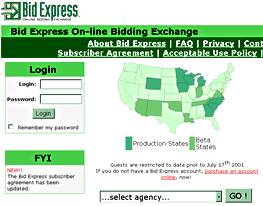 |
|
Beginning Jan. 18, Mn/DOT
will accept electronic bids from contractors. The electronic bidding process
will make it possible to announce the results of all bids immediately
after receipt—in person and on the Internet.
|
On Jan. 18, the "information superhighway" will become a starting
point for actual building of Minnesota highways. That’s the deadline for contractors
to submit bids for the first 16 construction projects on which Mn/DOT will accept
electronically submitted bids.
It’s also when bidders will find out the results—in real time—without needing
to travel long distances through Minnesota’s weather, or without needing to
leave their own offices.
"There’s a lot of excitement on the contractors’ part about not having
to drive, say, from Warroad to St. Paul, especially at this time of year,"
said Gary Ericksen, pre-awards unit supervisor in the Office of Construction
and Contract Administration.
Ericksen is excited too: the electronic bidding process will make it possible
to announce the results of all bids immediately after receipt—in person and
on the Internet.
"We expect to save time and a lot of errors from having to keypunch all
of the bids," he said.
It has taken time to get to this stage, however, he said. Mn/DOT began studying
e-bidding’s potential in 1999. Study time paid off last year when the 2001 Minnesota
Legislature authorized electronic bidding as part of the streamlining effort.
The projects in this first electronic letting include a segment of Hwy 100
reconstruction located near the Golden Valley construction office in the Metro
area, along with several Hennepin and Dakota County projects and a project from
St. Louis County.
Mn/DOT also conducted tests of the system under simulated conditions.
"We had four mock lettings and 28 contractors who volunteered to go through
training and bid on the dummy projects," Ericksen said.
E-bidding will become an alternative for traditional paper bidding, but companies
will still have a choice of submission methods.
"Mn/DOT will still accept hard copies forever from companies that are
not online or that choose not to submit electronically," Ericksen said,
adding that this won’t slow down results. Mn/DOT asks contractors to submit
bids on the same forms used online.
"We also prefer it if they provide us a hard disk so we can enter it automatically,
but we don’t require it," Ericksen said. Staff will compare the hard copy
to the disc supplied with it, and if there are differences, the hard copy version
will prevail.
The contractors’ enthusiasm suggests that e-bidding will become their preferred
method, Ericksen said.
"All of the contractors who want to be trained have already been trained
in the software we’ll use," he explained. "This includes contractors
who’ve accounted for over 90 percent of our construction work—if you go by dollar
amounts."
The contractors’ interest in e-bidding makes sense when viewed from their perspective.
"Without this, they send bids using two drivers in two separate cars,
one as a backup, and if they’re traveling long distances, they do it the night
before," Ericksen said. "Instead, they’re talking about getting two
Internet service providers so they can be sure of getting their bids in on time."
Mn/DOT will use software and encrypted submission processes developed by Bid
Express, an online services company. Bid Express also handles electronic bidding
for six other state transportation departments—Georgia, Iowa, Michigan, North
Carolina, South Carolina and Wisconsin. Seven other states are testing the system.
"Georgia’s been up for over a year and half now," Ericksen said,
"and 70 percent of the dollar amount of their bid lettings is coming in
over line."
To use the system, potential bidders must have Internet access and sign up
with Bid Express, as well as get a security code for electronic signature of
bids. Contractors will have 24-hour access to key information online through
the Minnesota home page on Bid
Express’s Web site. Contractors not signed up with Bid Express can still
get 24-hour access to information posted on Mn/DOT’s
Web site.
Data privacy and security are big concerns for both Mn/DOT and contractors.
So is access in case of power outages. To satisfy those concerns, the e-bidding
contractor has to duplicate systems—just the way construction contractors do.
"Bid Express has redundant access in two different areas, as well as two
backup systems," Ericksen said. "Also, they tested their system for
security, and discovered that it would require very expensive Cray computers
and it would still take more time and money to break the system than it would
be worth to a competitor."
|



